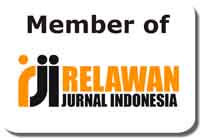Learner Autonomy in EFL Online Classes in Indonesia: Students’ Voices
Abstract
Keywords
Full Text:
PDFReferences
Ahn, M. (2017). Student Perception of Language Achievement and Learner Autonomy in a Blended Korean Language Course: The Case Study of Defense Language Institute Foreign Language Center [Dissertation]. https://media.proquest.com/media/pq/classic/doc/4324866165/fmt/ai/rep/NPDF?_s=Z4OutJVR07rrABqECJv7Gqw5BnM%3D
Albashtawi, A. H., & Al Bataineh, K. B. (2020). The Effectiveness of Google Classroom Among EFL Students in Jordan: An Innovative Teaching and Learning Online Platform. International Journal of Emerging Technologies in Learning (IJET), 15(11), 78. https://doi.org/10.3991/ijet.v15i11.12865
Andrade, H. L. (2019). A Critical Review of Research on Student Self-Assessment. Frontiers in Education, 4. https://doi.org/10.3389/feduc.2019.00087
Ashraf, H., & Mahdinezhad, M. (2015). The Role of Peer-assessment versus Self-assessment in Promoting Autonomy in Language Use: A Case of EFL Learners. International Journal of Language Testing, 5(2), 110–120.
Bailey, D., Almusharraf, N., & Hatcher, R. (2020). Finding satisfaction: Intrinsic motivation for synchronous and asynchronous communication in the online language learning context. Education and Information Technologies. https://doi.org/10.1007/s10639-020-10369-z
Bedoya, P. A. (2014). The Exercise of Learner Autonomy in a Virtual EFL Course in Colombia. HOW Journal, 21(1), 82–102.
https://doi.org/10.19183/10.19183/how.21.1.16
Budiharto, R. A., & Amalia, L. (2019). Motivation Behind Indonesian Undergraduates Learning English As A Target Language. IDEAS: Journal on English Language Teaching and Learning, Linguistics and Literature, 7(1). https://doi.org/10.24256/ideas.v7i1.714
Chen, C.-H., & Yang, Y.-C. (2019). Revisiting the effects of project-based learning on students’ academic achievement: A meta-analysis investigating moderators. Educational Research Review, 26, 71–81.
https://doi.org/10.1016/j.edurev.2018.11.001
Creswell, J. W., & Creswell, J. D. (2017). Research Design: Qualitative, Quantitative, and Mixed Methods Approaches. SAGE Publications.
Darsih, E. (2018). Fostering Language Learner Autonomy: Indonesian EFL Lecturers Voices. English Review: Journal of English Education, 7(1), 51–60. https://doi.org/10.25134/erjee.v7i1.1495
Farris, P. J., & Werderich, D. E. (2019). Language Arts: Process, Product, and Assessment for Diverse Classrooms, Sixth Edition. Waveland Press.
Gholami, H. (2016). Self-Assessment and Learner Autonomy. Theory and Practice in Language Studies, 6(1), 46–51. https://doi.org/10.17507/tpls.0601.06
Guo, P., Saab, N., Post, L. S., & Admiraal, W. (2020). A review of project-based learning in higher education: Student outcomes and measures. International Journal of Educational Research, 102, 101586.
https://doi.org/10.1016/j.ijer.2020.101586
Hsieh, H.-C., & Hsieh, H.-L. (2019). Undergraduates’ Out-Of-Class Learning: Exploring EFL Students’ Autonomous Learning Behaviors and Their Usage of Resources. Education Sciences, 9(3), 159.
https://doi.org/10.3390/educsci9030159
Istifci, I. (2016). Perceptions of Turkish EFL Students on Online Language Learning Platforms and Blended Language Learning. Journal of Education and Learning, 6(1), 113. https://doi.org/10.5539/jel.v6n1p113
Koirala, S. (2020). Toward a negotiated autonomy: Culture, teaching perceptions, and participation of Bhutanese refugees in an adult migrant English program in Australia. TESOL Journal, 11(1). https://doi.org/10.1002/tesj.460
Lengkanawati, N. S. (2017). Learner Autonomy in The Indonesian EFL Settings. Indonesian Journal of Applied Linguistics, 6(2), 222–231.
https://doi.org/10.17509/ijal.v6i2.4847
Little, D. (2003). Learner autonomy and second/foreign language learning. In CIEL Language Support Network (Ed.), The Guide to Good Practice for Learning and Teaching in Languages, Linguistics and Area Studies.
Liu, G. (2016). A Study on the Autonomous Learning Validity of Chinese EFL Students. Journal of Language Teaching and Research, 7(4), 738. https://doi.org/10.17507/jltr.0704.14
Maarif, A. N. (2020). The Implementation of Peer Tutoring in Learning Reading for EFL Learners. JEEP (Journal of English Education Program), 7(1), Article 1. https://jurnal.unigal.ac.id/index.php/jeep/article/view/4311
Mangasi, P. L. (2019). Implementation of SQ3R to Increase Reading Interest, Critical Thinking Skills, and Ability to Understand Indonesian Language Reading of 6th Grade Indonesia A Students. International Journal of Theory and Application in Elementary and Secondary School Education, 1(1), 71–81. https://doi.org/10.31098/ijtaese.v1i1.10
Meddas, M. (2019). The Role of Peer Tutoring in Developing Middle School Pupils’ Corrective Feedback: A Case Study of Fourth year Pupils at Mohamed Chaabani Middle School, Ouled Djellal [Thesis]. http://archives.univ-biskra.dz:80/handle/123456789/14834
Morales, H. S., & Mena, G. (2016). Student Self-Evaluation and Autonomy Development in EFL Learning. Revista de Lenguas Modernas, 199–222. https://doi.org/10.15517/rlm.v0i25.27695
Orawiwatnakul, W., & Wichadee, S. (2017). An Investigation of Undergraduate Students’ Beliefs about Autonomous Language Learning. International Journal of Instruction, 10(01), 117–132. https://doi.org/10.12973/iji.2017.1018a
Otto, W. (2014). Reading Expository Material. Elsevier.
Rahman, Abd., & Suharmoko. (2018). Building Autonomous Learners in English as a Foreign Language (EFL) Classroom. Proceedings of the International Conference on Education in Muslim Society (ICEMS 2017). International Conference on Education in Muslim Society (ICEMS 2017), Banten, Indonesia. https://doi.org/10.2991/icems-17.2018.44
Rice, S., Rizal, F., Yulastri, A., Riswandi, P., & Hayadi, B. (2019). Application of The SQ3R Method to Improve Learning Motivation and Ability to Read English Text Understanding of it in Vocational High School of Ibnu Sina Batam. Proceeding of the 1st Workshop on Environmental Science, Society, and Technology, WESTECH. https://doi.org/10.4108/eai.8-12-2018.2284030
Schmidt, N., & Wehmeyer, H. (2016). Self-Assessment Training in The ESL Classroom: A Crucial Step in Developing Learner Autonomy. Journal of Second Language Acquisition and Teaching, 23(0), 74–97.
Shams, I. E. (2013). Hybrid Learning and Iranian EFL Learners’ Autonomy in Vocabulary Learning. Procedia - Social and Behavioral Sciences, 93, 1587–1592. https://doi.org/10.1016/j.sbspro.2013.10.086
Sholihah, I., Retnanindyah, P., & Anam, S. (2019). Developing Autonomous Learners in Japan: Working with Teachers Through Professional Development. Jurnal Education and Development, 7(2), 50–50. https://doi.org/10.37081/ed.v7i2.868
Suganya, S. (2019). The Effective Role of Reading Comprehension in Developing Communication through SQ3R Method (SSRN Scholarly Paper ID 3497334). Social Science Research Network. https://doi.org/10.2139/ssrn.3497334
Sukhenko, O. (2019). Fostering Learner Autonomy: Self-evaluation in Enhancing English Writing Skills. Konteksty Pedagogiczne, 1(12). https://doi.org/10.19265/KP.2019.11253
Tayjasanant, C., & Suraratdecha, S. (2016). Thai EFL Teachers and Learners’ Beliefs and Readiness for Autonomous Learning. 3L The Southeast Asian Journal of English Language Studies, 22(3), 153–169. https://doi.org/10.17576/3L-2016-2203-11
Tharayil, S., Borrego, M., Prince, M., Nguyen, K. A., Shekhar, P., Finelli, C. J., & Waters, C. (2018). Strategies to mitigate student resistance to active learning. International Journal of STEM Education, 5(1), 7. https://doi.org/10.1186/s40594-018-0102-y
Tight, M. (2017). Understanding Case Study Research: Small-scale Research with Meaning. SAGE.
Tran, T. Q. (2020). EFL students’ attitudes towards learner autonomy in English vocabulary learning. English Language Teaching Educational Journal, 3(2), 86. https://doi.org/10.12928/eltej.v3i2.2361
Wiraningsih, P., & Dewi, N. L. P. E. S. (2020). The roles of EFL Teachers in Promoting Learner Autonomy. Jurnal Pendidikan dan Pengajaran, 53(1), 13–24. https://doi.org/10.23887/jpp.v53i1.19241
Yuzulia, I. (2020). EFL Teachers’ Perceptions and Strategies in Implementing Learner Autonomy. Linguists: Journal Of Linguistics and Language Teaching, 6(1), 36–54. https://doi.org/10.29300/ling.v6i1.2744
Zakaria, N., Aziz, A., & Ramayah, K. (2017). Language Learning Strategies and Learner Autonomy in Learning Japanese. 50–60.
Zhou, Y., & Chen, Y. (2020). A Study on Reticence in College EFL Classrooms: The Role of Diffusion of Responsibility. English Language Teaching, 13(6), 133–143.
Zouaidi, C., & Hermessi, T. (2019). The Role of Intrinsic Motivation and Oral Corrective Feedback in the EFL Classroom. In S. Hidri (Ed.), English Language Teaching Research in the Middle East and North Africa (pp. 431–454). Springer International Publishing. https://doi.org/10.1007/978-3-319-98533-6_20
DOI: http://dx.doi.org/10.31332/lkw.v7i1.2637
Copyright (c) 2021 Rolisda Yosintha, Sukma Shinta Yunianti

This work is licensed under a Creative Commons Attribution-ShareAlike 4.0 International License.
Publisher:
UPT Pengembangan Bahasa, IAIN Kendari
Jln. Sultan Qaimuddin No. 17 Baruga, Kota Kendari, Sulawesi Tenggara
Website: upb.iainkendari.ac.id
Email: [email protected]


















